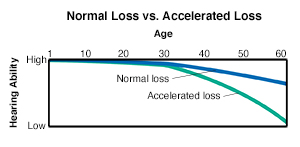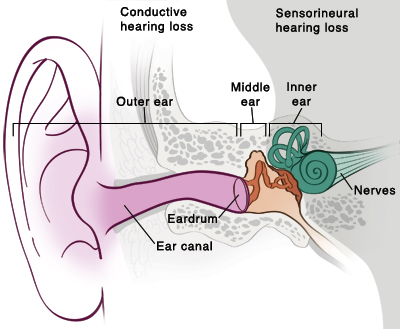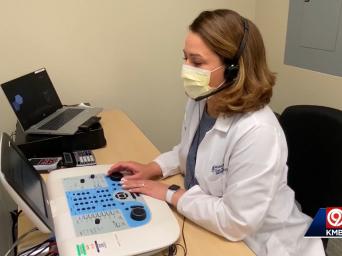Hearing Loss
Hearing loss is usually caused by either a temporary blockage or a permanent problem within the ear or brain that keeps sound from being heard or understood.
Saint Luke’s Hospital Midwest Ear Institute is dedicated to enhancing quality of life by restoring patients’ hearing. A nationally recognized cochlear implant center, our team of neuro-otologists have been restoring hearing with cochlear implants since 1980. We offer the full range of hearing services to both children and adults, from comprehensive diagnostics to hearing and balance treatment to our acclaimed cochlear implant program.
Saint Luke’s Hospital Midwest Ear Institute is staffed by a team of audiology experts who knows the importance of personalized care, and that one size doesn’t fit all – that’s why we offer patients the full range of hearing restoration services.
Understanding Hearing Loss
Understanding Hearing Loss
As you age, some hearing loss is normal. Long-term exposure to loud noises may speed up hearing loss. You may lose not only the ability to hear how loud a sound is, but also the ability to hear certain types of sounds. For example, you might not be able to hear some of the high-pitched sounds of a child's voice or a fire alarm.
Normal loss
With aging, tiny hair cells in the inner ear undergo changes. Nerve cells, also part of the inner ear, can also be affected. This is age-related hearing loss called presbycusis. Most people don't notice normal hearing loss until their middle years. Others might not notice it until late in their lives. It's most often a slow and painless process.
Accelerated loss
Exposure to loud noise may cause brief hearing loss and ringing in your ears called tinnitus. If your exposure was short, you may recover. But long-term exposure day after day can affect your hearing for life.

Noise hurts more than your hearing
Did you know that loud noises can affect your whole body? Loud noises can:
-
Raise blood pressure
-
Disrupt sleep patterns
-
Cause muscle strain
- Cause emotional stress
-
Harm digestion
Types of Hearing Loss in Children
Types of Hearing Loss and Disorders in Children
There are 3 main types of hearing loss:
-
Conductive hearing loss
-
Sensorineural hearing loss
-
Mixed hearing loss
An audiologist is a healthcare professional who specializes in hearing problems. They can tell you which type of hearing loss your child has. The audiologist can also help you find out the next steps of your child’s care.

How we hear
The ear has 3 parts, each with its own task. The outer ear collects sound and sends it to the middle ear. There sound is changed into vibrations. These vibrations travel to the inner ear where tiny “hair cells” (cilia) and the hearing nerve turn the vibrations into nerve impulses (signals). These signals are sent to the brain. The brain then figures out which ear the sound is coming from. With hearing loss, either a short-term (temporary) blockage or a lasting (permanent) problem in the ear or brain keeps sound from being heard or understood.
Conductive hearing loss
Conductive hearing loss is common in children. It can affect one or both ears. For someone to hear, sound signals must travel from outside the ear through the ear canal and eardrum into the inner ear. Conductive hearing loss results when sound becomes partly or fully blocked in the outer or middle ear. Some causes may include:
-
Fluid buildup behind the eardrum (often a complication of repeated ear infections)
-
Wax buildup in the ear canal
-
Problems with the eardrum
-
Infection
-
Growths
-
Abnormal formation of ear bones
-
Object stuck in the ear canal, such as food or a toy part
Conductive hearing loss is often temporary and may be improved with medical or surgical procedures. Once the blockage or problem is correctly treated, hearing often returns to normal. If fluid buildup behind the eardrum is the cause, a tiny tube may be inserted into the eardrum to help drain the fluid. The healthcare provider can tell you more about what’s causing your child’s hearing loss and how it can be treated or managed.
Sensorineural hearing loss
Sensorineural hearing loss can affect one or both ears. It's due to problems with the inner ear or damage to the hair cells or nerves inside the inner ear. To hear correctly, these hair cells and nerves must process and carry sound to the brain. The brain then senses what we “hear.” With sensorineural hearing loss, the hair cells or nerves are damaged and don't send the signals needed for hearing to the brain. Some causes may include:
-
Exposure to very loud noise
-
Infection of mother during pregnancy
-
Certain types of infection in the child
-
Medicines that are toxic to the ear (such as some IV antibiotics or cancer medicines)
-
Family history of permanent hearing loss
-
Premature birth
-
Severe jaundice
Sensorineural hearing loss is often permanent. So, treatment includes using devices that help the child hear as well as possible. These devices include:
-
Hearing aids. Electronic devices that make sound louder.
-
Cochlear implants. Surgically implanted devices that help the child sense sound. Cochlear implants are used when the hearing loss is too severe to be treated with hearing aids.
-
Assistive listening devices (ALDs) or hearing assistive technology systems (HATS). ALDs, such as FM (frequency modulation) systems, need the person speaking to wear a microphone. The person’s voice is then sent into the child’s hearing aids, cochlear implants, or earphones. ALDs let the child hear the person speaking without distracting background noise. FM systems can be used in classrooms to help children with hearing loss hear their teachers.
Mixed hearing loss
Mixed hearing loss is a combination of conductive and sensorineural hearing loss. Treatment depends on the cause of the hearing loss. A combination of treatment methods can be used to help the child hear well.
Hearing disorders
Auditory processing disorder (APD)
APD occurs when the ear works correctly, but the brain doesn’t interpret sound correctly. To hear words correctly, the brain must recognize and interpret the sounds that are sent to the brain. With APD, something keeps the brain from correctly processing or interpreting the sounds that make up a word or words. So subtle differences between sounds in words can't be heard and words are misheard. It is unknown why APD occurs. Some signs of APD include:
-
Poor listening skills
-
Trouble understanding speech and interpreting background noise
-
Trouble paying attention to and remembering information that is spoken (such as in a classroom)
-
Struggling with language, such as mixing up syllables in words
-
Trouble with reading, comprehension, spelling, and vocabulary
-
Poor performance, misbehavior, and frustration at school
Tests can be done to find out if your child has APD. Talk with your child’s healthcare provider if you think they need to be tested. Your child's audiologist can tell you which type of hearing disorder your child has. The audiologist can also help you determine the next steps of your child's care.
Auditory neuropathy spectrum disorder (ANSD)
In this condition, the inner ear works, but there is a problem that keeps the brain from recognizing and interpreting sound correctly. This causes words to be misheard. Sounds may also fade in and out. The cause of ANSD is unknown. Scientists think it may be linked to problems with the hearing nerve, but more research needs to be done. There are hearing tests available to check for ANSD that can be done by your child's audiologist.

